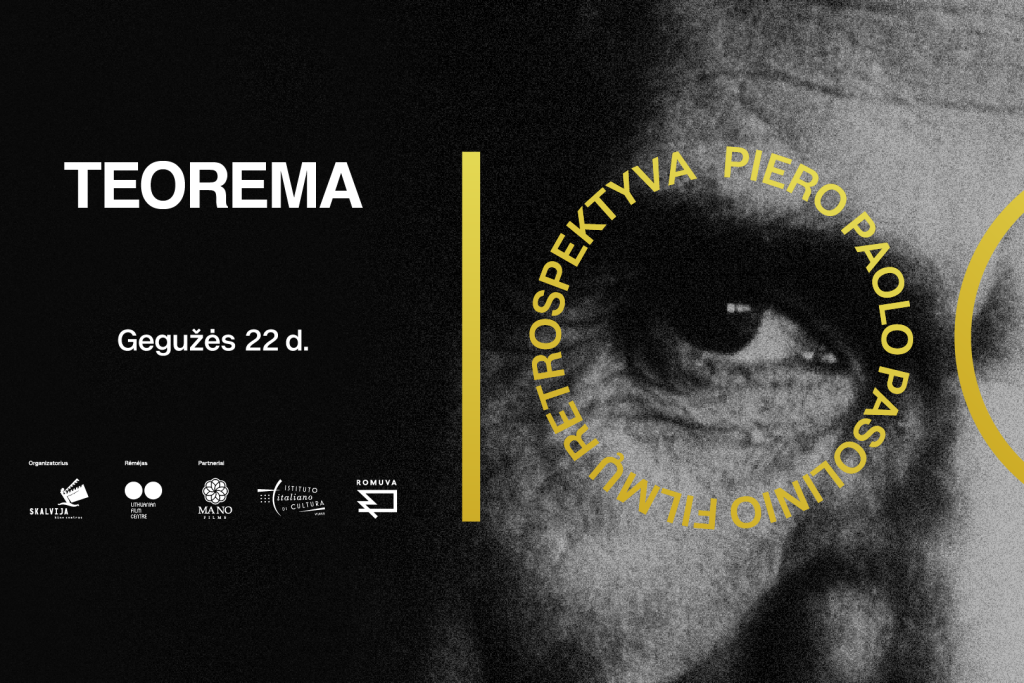Director, poet, philosopher, painter, writer - that was Pier Paolo Pasolini - one of the most prominent figures of the 100th century. Personalities of Italy and the world of cinema. This year, in commemoration of the XNUMXth anniversary of the artist's birth, the "Skalvijas" film center is organizing a retrospective of the director's films. Special Theorem session will also take place in Kaunas "Romuva" on May 22.
The "Skalvijas" film center, which presents a retrospective of the filmmaker once a year, has previously shown the works of Jonas Mek, Wong Kar-wai, Michelangelo Antonioni and other world-famous directors. This year, the focus is on the radical and intellectual Italian filmmaker Pasolinis, who in his work originally combined documentary, literary traditions and art history. The film program will show both early and well-known works.
Ten films of the director and a documentary are waiting for the audience in ten days "Voice of Ambassador" (2006), the author of which is M. Cerami, a relative of the creator who is coming to Lithuania. Poet and philosopher Aušra Kaziliūnaitė, political philosopher Egidijus Mardosas and M. Cerami will introduce his films to the audience who are getting to know Pasolini.

"Looking at Pasolini's work, the director's freedom to change drastically, his ability to reject one creative direction and take on a completely new one, as well as the author's wide-ranging, always engaged look is surprising - it is a joyful, loving look at an ordinary person, it is a fierce critic of society. There are more than one reason to show PP Pasolini's films in "Skalvija". First of all, this is a unique filmmaker. Secondly, this year we celebrate the centenary of the director's birth, more than twenty years have passed since the last comprehensive presentation of the creator in Lithuanian cinemas", says Eglė Maceinaitė, program coordinator of the "Skalvijas" cinema center, who created the retrospective program.
Pasolinis was born in Bologna in the family of an officer and a primary school teacher. Here he completed his studies in philology and began to write poems, joined the Communist Party. Breaking with established literary traditions, he began to write in the Friulian dialect. Writing poetry was dialectically understood as literary and political resistance - during the years of Mussolini's rule, any use of non-common language was forbidden. Also, Pasolini himself identified himself with the peasants who use slang. Even later, when making films, he used to cast non-professional actors in the roles of ordinary people, because, according to the director, a middle-class actor could not pretend to be a peasant or a factory worker.

Pasolinis began his film career as a screenwriter in Rome, assisting Federico Fellini in writing authentic street dialogues for the film Nights of the Cabiria (1957). He was already a recognized writer and poet in Italy, but he continued to search for a poetic language unfettered by tradition, which became cinema for him. For the director's early films "Akatone" (1961) and "Mother Rome" (1962) was influenced by Italian neorealism, which had already emerged at that time. In his recent works, he explored the bottom of society and revealed how a person is dependent on the environment.
Later, ideological films followed in the director's work, among which - "Gospel according to Matthew" (1964). According to the director, he read this gospel through the eyes of a Marxist and chose an economics student for the main role of Jesus. Pasolini was a personality full of contradictions. He considered himself a "Catholic Marxist", was openly homosexual and was allegedly expelled from the Communist Party for this.
"Oedipus the King" (1967) "Theorem" (1968) and "Medea" (1969) marks the director's Freudian phase in which he explored the human subconscious and inner world. In the late period of his career, he took up the adaptation of literary works and created the "Trilogy of Life", which consists of The Decameron (1971) The Canterbury Tales (1972) and Arabian Nights (1974). In these films, the director broke away from ideology and created vivid films inspired by works of art, full of carnality and eroticism.

Pasolinis himself probably had no idea that it would be his last film "The Island, or the 120 Days of Sodom" (1975). In the same year, he was brutally murdered, and the cause of his death is still unknown. This work is one of the most controversial in the history of cinema, and was banned in many countries for a long time. The film is set in northern Italy during the last days of Mussolini's rule: four fascists imprison a group of boys and girls in a remote villa, engage in perverse orgies and brutally torture them. Pasolini criticized consumerism and the abuse of the body with this film. "Consumerism, like Nazism, manipulates and despises the body," said the director.
Pasolini's death shocked the whole world and was compared in Italy to the assassination of John F. Kennedy. His work later inspired many filmmakers: Rainer Werner Fassbinder, Derek Jarman, Abel Ferrara and others. He raised the Italian cinema provocateur Bernardo Bertolucci on his film plot.
In addition to the film retrospective, M. Cerami's creative workshop will be held for the students of the Lithuanian Academy of Music and Theater, and the exhibition of the photographer Robert Villas, who captured the filming of Pasolini's film "Arabian Nights" in the Middle East, will be opened at the Lithuanian Museum of Music, Theater and Cinema.
The retrospective is sponsored by the Lithuanian Film Center. The initiator of the retrospective is Giedrius Zubavičius (MA NO FILMS). Event partner: Institute of Italian Culture in Vilnius.

